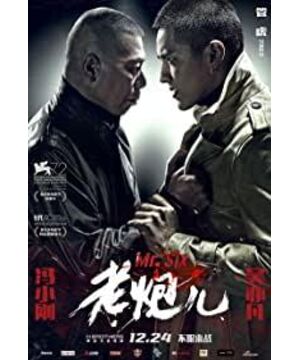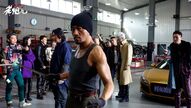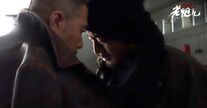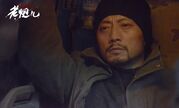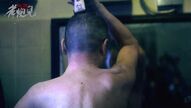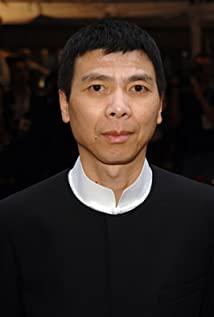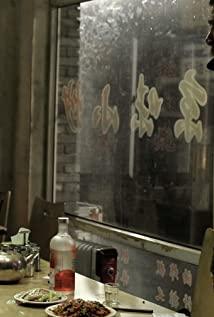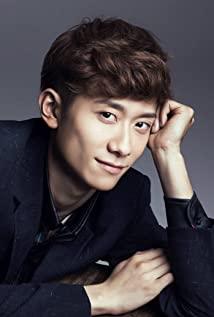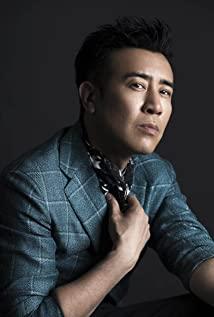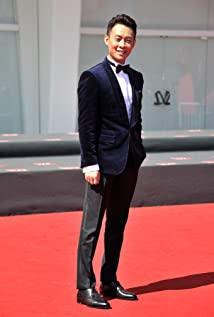First published on WeChat public account: movie432, there is a QR code at the end of the article~
In Hong Kong, if you speak Cantonese, "Old Pao'er" may be a third-level film. Level 3 does not come from violence. The sabers still have murderous aura, and their sharp edges are cold. If they were brought up to wander around in public places, they must also be classified as controlled knives. They were captured by the people's police on the spot. However, the violence of this movie looks like it. At best, I broke my fingers and added a sap, but the frame didn't start. The function of the saber is only used for sensationalism. Level 3 is even more unlikely to be from erotica. Although it was spoiled long ago - Feng Xiaogang entered Xu Qing after his violent upheaval. Think of these two people, they are more than a hundred years old together. Even in broad daylight, it seems to be quite exciting and sultry just by imagination. But eroticism is just the first to inform the old gunner: he is no longer good.
The real reason for the third grade must come from foul language. In reality, many people may not like foul language, but in movies, it often represents a certain authenticity and is connected with the character of the character. The matter of foul language was a bumpy ride in the face of difficulties such as film censorship, moral weathering, and teaching bad children. In my personal opinion, the full firepower of "Old Pao'er" is not necessarily from the director's resistance, but the operation of capital forces. The loosening of foul language, from allowing foul language to appear in the mouths of movie characters, but must be blurred in the subtitles. If it cannot be obfuscated until now, it is simply omitted. You hear the curse, but you don't see it. The three words "X your mother" appearing in today's mainstream cinema movies seem to be a new thing. But besides "Lao Pao'er", there have actually been many independent films or Chinese films from 20 years ago. Behind the foul language, from the title to the lines, "Lao Pao'er" is full of dense, gangster-like, Beijing indigenous dialects. In order to preserve the original flavor, the Chinese subtitles are also translated in brackets. This is another weird phenomenon. As we all know, from Cantonese, which is commonly used in Hong Kong movies, to small local languages that are consciously suppressed, dialect movies have always been a relatively weak existence in China. "Old Pao'er" is openly enlarged and full, and it is still sound, smooth and refreshing to listen to. Think about how Deng Chao kept reciting "I fuck your mother" in Mandarin in "Burning Sun", how strange it sounds to me when you say it is strange. If it is said, foul language is more representative of language violence. The dialect without translation has the meaning of unfamiliarity, estrangement and exclusion. At the simplest level, you are not your own, you are not from this generation, or even a foreigner who broke in. The verbal inquiries and conflicts in "Old Pao'er" began with passers-by asking for directions, some old friends greeted them, and finally the stalemate between father and son. Lao Pao'er is a group of people, Feng Xiaogang is a person. This Chinese director, who is famous for his love of bombardment and feels very good about himself, calls himself a great grandson. To regard him as a representative of Lao Pao'er and throw him in the dye vat of Chinese movies is simply a match made in heaven.
At the Golden Horse Awards, Feng Xiaogang gave a testimonial on his mobile phone, ridiculing himself as a new actor. In fact, he has a lot of performance experience. But most of them are frivolous and exaggerated harlequins, serving as decorations. For example, "Sino-Russian Nerchinsk Treaty" in "Sunny Days", "Who Else" in "Kung Fu", "Farewell" in "Let the Bullets Fly". The last time Feng Xiaogang performed as the leading role was in Wang Shuo's "I Am Your Dad". That's right, it's still Beijing, it's still playing a father, and it's still my father who can't communicate with his son. Therefore, he has been run on by people, eating Wang Shuo's old money, and eating a piece of the world. Just like in "Old Pao'er", some people want to say that when Cui Jian sings and grows old, this generation also grows old. "Old Pao'er" makes the appearance of the characters quite mysterious, and has been hiding them all the time. Liu Ye's first appearance, he didn't see him, he heard his voice first. Then, he took the help of his neighbor's greetings and brought out his son who did not show up. Hidden to the end is the richness of Liu Ye's past. In the end, the sixth master turned over the box with a solemn face, opened the portrait of his wife, and found a piece of equipment. Shave your head, get a coat, and carry a saber, reappearing the style of the past, and seeing death as if you were at home.
From the perspective of educating the audience, "Old Pao'er" is of course a negation of "the mutual negation between father and son". Whether with Xiaobo or Xiaofei, from riding a bicycle to shaking hands, Liu Ye has a symbolic reconciliation with them. Guan Hu retains the characteristics of life and strong motivation in the video, and even conceals a completely different male aesthetic in the confrontation and generation gap between the old and the young. Most people must think that looking for Wu Yifan and Li Yifeng is a shortcut to attract fans like TFBOYS, who was left in the ward and dressed like a mosaic doll. However, from Feng Xiaogang's roughness to Zhang Hanyu's toughness, it is not difficult to find that this kind of appearance comparison based on a male perspective is so distinct. Guan Hu's provocative images are topped by a series of close-up shocks, exhaustion and violent gasps on the ice lake. "Thinking of the run on the ice lake that day, that was my lost youth." Someone said in a sentence.
The moment they set foot on the lake, many people thought of ice cracks and collapses, which indicated danger, but it was more like the externalized expression of the inner heart, the chaotic cracks, just like the chaotic blood vessels. These close-up shots must be nightmares when used on Huang Xiaoming or Yang Mi. But sticking to Feng Xiaogang's slack old face actually made him perform in his true colors, just like Huang Bo's sense of drama in "Bull Fighting", and the experience-style acting skills were well-done. Whether in public image or in reality, Feng Xiaogang appears as an old-fashioned, old-fashioned, hard-nosed man who is extremely controversial. "Old Pao'er" captures the aging and pressure from his face to the body, and the hardness and fear in his words. In particular, the disease continues to erode the body's sense of impending danger, and it fits perfectly. The tough old gunner, pretending to be awe-inspiring in the twilight, is unwilling to face aging. As a result, they were still defeated, and big tears rolled down their faces. In addition to Guan Hu's personal over-the-top images, "Old Pao'er" still has many flaws. Since Xiaobo returned in an incredible way, directing the film to a politically correct anti-corruption whistleblower. And to Lao Pao'er's self-knowledge that "I'm a little common man" makes this movie strange. Even if it targets bad guys, out-of-towners, or southerners who take the blame for anything other than young people, even if it is more controversial, it will be more complete in the play. The "returning things" led by this line accidentally destroyed the living space set up by the movie, and also made the story generated by the drag racing show signs of out of control - such as Xiao Fei who was moved to tears. And the video that stopped abruptly (without watching the easter eggs after the subtitles) left room for imagination. For example, the letter may not have been cast. But "Old Pao'er" also has a commendable feature, and it is also the most difficult place in my opinion. It shows that time has changed, and it also explores the warmth and self-knowledge. In my opinion, it's more realistic than fanning and old tears. Just like the second master who didn't say a word, "Old Pao'er" did not shy away from the destitute, low-income people who set up stalls, low-income people, and those who lived alone in the aboriginal old Beijing, which made the ceremony of meeting with a knife even more ironic and powerful. And in the early morning when Sixth Master set off for Wild Lake, a surveillance camera appeared on the screen on purpose. This society is indeed very harmonious. Probably living in Beijing for some years, "Old Pao'er" attracted me, as well as the spatial layout of the city of Beijing. Just like communicating with friends, after coming to Beijing, movies like "Seventeen-Year-Old Bicycle" and "Lan Yu" are suitable for rewatching. Because they, intentionally or unintentionally, recorded the style of Beijing in the past. Liu Ye lived around Yinding Bridge, around Ya'er Hutong to Anmen in Houhaiti. He also goes to bars, but during the day. He's on ice too Field, but one person. From the Jingshan Park where the birds are buried in the south to the Drum Tower where the money is paid back in the north, this place is the heart of Beijing well known to indigenous peoples, tourists and outsiders. In the past, when you stood on the Yinding Bridge and looked westward, you could see the West Mountain at the end of the Houhai Sea, which was called "Yinding Guanshan". In the direction of Xishan, there is also the Summer Palace Wild Lake, which is about to be framed later. Of course, with the current air quality in Beijing, not to mention Xishan, Houhai often has no head in sight.
Today's Beijing continues to be extended, and the places that appear in the movie also include the Third Hospital of Beijing Medical University, which goes to see a doctor, the Sanlitun Jingkelong that borrows money to pass through, and the South Third Ring Road Automobile Reconstruction Factory that redeems people. The movie also featured a larger subway loop line, Line 10, bound for Caoqiao Station. But this Beijing is obviously a Beijing that Liu Ye is not familiar with. Beijing, the old Beijing, was sealed in the Forty-Nine City, a city wall that disappeared that they had never seen with their own eyes. In the new century, the speed of urban expansion before and after the Olympic Games is more like the life-threatening journey of drag racing. As for the old Paoer, he only got off the car obediently, vomited on the railing, and understood that the times and gameplay were different, and it was the time gap set by the director. Sixth Master regards himself as the number one person from the bottom of his heart (it may have been twenty years ago), and he is nosy and obeys the rules. In fact, he is a little old man who dares to shake his face without having to go out of Houhaitian to set up a gate and leave those alleys. But his son's affairs are still up to him, and everything depends on those few words: I am your father. I'm old, I'm beaten, I can't get up, I'm your father. This story does not have to be about a generation, it can be just one person. This kind of old-fashioned sadness will always become a rare existence in the images of Chinese films. It's not vulgar chicken soup, it's self-moving with positive energy. It is also said that this is the era of 40 billion, and there is no time to be sad and melancholy. Hundreds of thousands in a second, there is no time to sigh. Well, who cares if you sighed your last breath. But sadness or grief, they should also be a strength—at least in this timeless tale of aging and the conflict between father and son.
Take an excerpt to the end. Most people die at the age of twenty or thirty: after this age, they only change their own shadows, and the rest of their lives are only used to imitate themselves, and to take what was said in a truly human age before. , What you do, what you think, what you like are repeated day by day, and the way of repetition is more and more mechanical and more and more out of the way. But those who died, those who fell, and those who could not go back were more than these old gunners. In such an era, we are celebrating the box office figures and a harmonious society, and even the sorrow of the old Paoer, I am afraid it must be celebrated. [Exclusive feed from Shadow Cafe. Do not repost without notice】
View more about Mr. Six reviews


